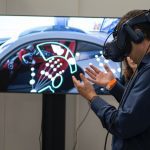Technology has always been closely linked with Education. Each day we get to learn about some new technology that will change the world and the way we learn it. The history of technology-enabled education began in the 1920s, with broadcasting education-related radio program for school students. Ever since then the technology has evolved rapidly. The first computer-assisted … [Read more...] about Virtual Reality Innovation in Education
AR / VR
Explore the world of virtual and augmented reality. Discover the latest advancements in VR and AR technology and how they are being used in various industries. Learn how to get started with VR and AR and find resources for further learning.
An Introduction to VR Development
Virtual reality has made it possible for people to enjoy and experience everything without leaving the comfort of their house. VR goggles have the potential to bring an entire set of reality in front of your eyes. Today, VR shown in movies is not a far-fetched dream anymore; it's closer to becoming a reality. From books to places, you can experience anything on a VR set … [Read more...] about An Introduction to VR Development
How AR, VR and MR are Changing The Way Businesses Interact With Customers
For decades, the topics of augmented reality, virtual reality and mixed reality have been more readily associated with science fiction films and elaborate predictions for the future. However, today, the very same technology is actively transforming our daily lives. From real estate, to computer games, to healthcare and education - there's plenty of examples of industries that … [Read more...] about How AR, VR and MR are Changing The Way Businesses Interact With Customers
Why the arrival of Google Stadia may lead to big things for augmented reality
In March 2019, Google made an announcement that had huge ramifications for the wide world of gaming. Stadia is on its way and with it comes a brave new era of video game streaming. The arrival of Google Stadia has caused a stir in the gaming community, but its rather significant implications for Augmented Reality hasn't commanded much media coverage over the past few months. So … [Read more...] about Why the arrival of Google Stadia may lead to big things for augmented reality
How Remote AR Has The Power to Revolutionise How We Collaborate
Augmented reality is an emerging technology that's set to challenge traditional approaches towards collaboration across multiple fields. The world's continually getting smaller, with businesses making use of recruiting staff globally as well as embracing the emerging gig economy. But while the recruitment of remote workers carries a wealth of benefits in guaranteeing a deeper … [Read more...] about How Remote AR Has The Power to Revolutionise How We Collaborate
What is virtual reality (VR)?
VR is a computer-generated simulation of a three-dimensional environment that can be interacted with in a seemingly real or physical way. VR is typically experienced using a headset and hand controllers, which track the user’s movements and allow them to interact with the virtual environment.
VR can be used for a variety of purposes, such as gaming, training, and entertainment. It has the potential to create immersive and interactive experiences that are not possible in the real world.
What is augmented reality (AR)?
AR is a technology that superimposes digital information or graphics onto the real world, creating a layered experience. AR can be experienced through devices such as smartphones, tablets, or specialized glasses, which use cameras and sensors to track the user’s movements and display the digital content on top of the real world.
AR is used for a variety of applications, including gaming, education, and advertising. It has the potential to enhance the real world with interactive and informative digital content.
What are the differences between VR and AR?
VR creates a fully immersive, computer-generated environment, while AR enhances the real world with digital information. VR requires specialized equipment, such as a headset and hand controllers, to experience, while AR can be accessed through everyday devices such as smartphones.
VR is typically used for fully immersive experiences, while AR is more commonly used for overlaying digital content onto the real world.
What are some examples of VR and AR?
Examples of VR include video games, educational simulations, and virtual tours. Examples of AR include Pokemon Go, Snapchat filters, and interactive museum exhibits. These are just a few examples of the many possible applications of VR and AR, which are being used in a wide range of industries and contexts.
How can I learn more about VR and AR?
There are many resources available for learning about VR and AR on Datafloq, including online courses, books, and industry events. Online courses, such as those offered by Coursera, edX, and Udacity, can provide a comprehensive overview of the technologies and their applications.
There are also many books on VR and AR that cover various aspects of the technologies and their uses. Attending industry events, such as conferences or meetups, can also be a great way to learn about VR and AR and network with others in the field. It is also possible to try out VR and AR experiences at specialized centers or through demos provided by companies that develop VR and AR technology. This can be a great way to get a firsthand experience of what these technologies are capable of.







